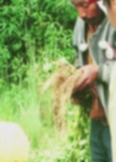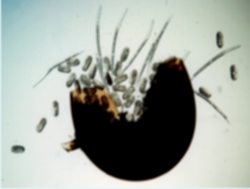PSP RESEARCH OVERVIEW - CROP TRANSFORMATION
The control of nematode pests in rice, potato and banana.
 Root
knot nematodes (Meloidogyne spp.) account for the majority of the $100
billion (US) of annual loss attributed to nematode damage in crops. In the
tropics, average crop production is reduced by 11-25% as a result of damage
by nematodes. Crop resistance is a low-cost option for nematode control in
subsistence agriculture. It does not impose unwanted changes on traditional
agronomic practices. The range of single traits available for breeding programmes
currently limits the number of nematode-resistant crops available. In addition,
pathotypes, or species that overcome resistance, often challenge the utility
of resistance.
Root
knot nematodes (Meloidogyne spp.) account for the majority of the $100
billion (US) of annual loss attributed to nematode damage in crops. In the
tropics, average crop production is reduced by 11-25% as a result of damage
by nematodes. Crop resistance is a low-cost option for nematode control in
subsistence agriculture. It does not impose unwanted changes on traditional
agronomic practices. The range of single traits available for breeding programmes
currently limits the number of nematode-resistant crops available. In addition,
pathotypes, or species that overcome resistance, often challenge the utility
of resistance.
 The
DFID Plant Sciences Research Programme (PSP) has now reduced some of these
constraints in two ways. We have established the molecular mapping techniques
and strategy to identify the location of genes in West African rice landraces
that confer resistance to nematodes. The value of additive natural and transgenic
resistance has also been demonstrated, providing a more robust defence. The
use of transgenes broadens crop resistance by protecting plants from nematodes
for which natural resistance genes are unavailable. Broadly based nematode
resistance also avoids the need for farmers to recognise and distinguish nematode
species.
The
DFID Plant Sciences Research Programme (PSP) has now reduced some of these
constraints in two ways. We have established the molecular mapping techniques
and strategy to identify the location of genes in West African rice landraces
that confer resistance to nematodes. The value of additive natural and transgenic
resistance has also been demonstrated, providing a more robust defence. The
use of transgenes broadens crop resistance by protecting plants from nematodes
for which natural resistance genes are unavailable. Broadly based nematode
resistance also avoids the need for farmers to recognise and distinguish nematode
species.
Visit the PSP project database and virtual library for further details of the above and other projects.
PSP AT A GLANCE
Website Constructed and Maintained by C.M. Stirling.